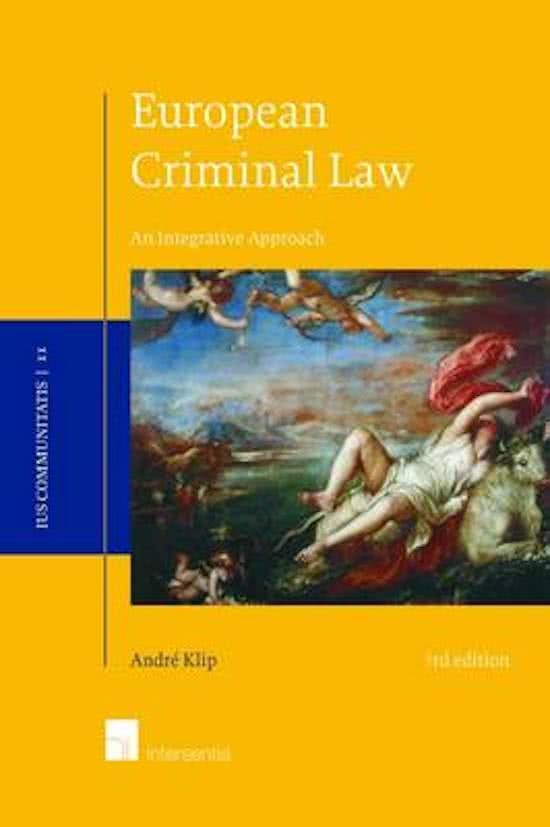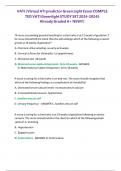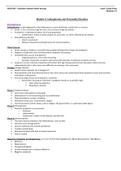Current questions on EU criminal law and future perspectives
LITERATUR:
- Andre Klip p. 37-40, 175-195, 238-243, 335-349, 527-454.
- Manifesto on EU criminal law policy by the criminal law policy initiative
- Manifesto on EU criminal procedural law by the Criminal law policy initiative
- Legislation
o Draft Council conclusions on guidelines and model provisions for criminal law
o Council Decision 2009/316 on the establishment of the EU criminal Records Information
System, in application of article 11 FD 2009/315
o Protocol (no 2) on the application of the principles of subsidiarity and proportionality
o Commission proposal for a Directive on the fights against fraud to the Union’s financial
interests by means of criminal law
o FD 2008/675 on taking account of convictions in the MS of the EU in the course of new
criminal proceedings
o EP Report on an EU approach on criminal law
CRIMINAL LAW COMPETENCES
Article 82 & 83 TFEU
Article 82 TFEU brings mutual recognition in general terms within the scope of the EU’s competence,
and gives in particular the European Parliament and the Council general regulatory powers on this
matter.
Article 83 TFEU is the fundamental provision as far as the harmonisation of substantive criminal law
is concerned; this article lists the areas in which the approximation of laws can be realized and it
distinguishes between the cases of
- “particularly serious crime with a cross-border dimension” and the ones in which the
approximation proves essential
- “to ensure the effective implementation of a Union policy in an area which has been subject
to harmonization measures”.
Article 83 TFEU: cross-border elements: the legislator takes this into account when adopting new law
according to this article. And yes it is necessary for the EU to exercise their competences.
National legislator has full competence in criminal law, the EU legislator has more restricted powers
for legislation; art 83 p1 (basic criminal law competence, directives which set minimum rules for the
offences listed, if they want to legislate other offences they have to do that with full unanimity ) and
p2 (the competence to criminalize a broader scope, for effective implementation of a Union policy
which has already been harmonized; for example agriculture BUT it has to be ESSENTIAL!!!)
The EP and the Council may, by means of directives If the approximation of criminal laws and regulations of
adopted in accordance with the ordinary legislative the MS proves essential to ensure the effective
procedure, establish minimum rules concerning the implementation of a Union policy in an area which has
definition of criminal offences and sanctions in the been subject to harmonisation measures, directives may
areas of particularly serious crime with a cross-border establish minimum rules with regard to the definition of
dimension resulting from the nature or impact of such criminal offences and sanctions in the area concerned. Such
offences or from a special need to combat them on a directives shall be adopted by the same ordinary or special
common basis. legislative procedure as was followed for the adoption of
These areas of crime are the following: terrorism, the harmonisation measures in question, without prejudice
trafficking in human beings and sexual exploitation of to Article 76.
women and children, illicit drug trafficking, illicit arms areas where already is harmonisation
linked to other competences
,trafficking, money laundering, corruption, counterfeiting of procedure depends on where competence
means of payment, computer crime and organised comes from
crime. unlimited list
On the basis of developments in crime, the Council creates the other competence (= codification of the
may adopt a decision identifying other areas of crime Court’s case law) when the approximation of CL proves
that meet the criteria specified in this paragraph. It shall essential to ensure the implementation of the Union’s
act unanimously after obtaining the consent of the policy in an area that is already subject to harmonisation.
European Parliament.
competence on itself
normal legislative procedure
limited list
Provides 2 reasons for the approximation of the CL
and regulations of the MS:
-Nature of impact of the offences.
-Special need to combat the offences upon a
common basis.
Art 325 TFEU: This art makes reference to one specific crime: ‘fraud and any other illegal activities
affecting the financial interests of the Union’. It is a special obligation, on top of the obligation of
sincere co-operation. MS must do this in the light of the assimilation principle. Taricco: whether or
not article 325 could be a legal basis to criminalize conduct yes. Some argue that only 82 & 83
TFEU could be used for a legal basis.
MINIMUM RULES
A minimum rule in procedure law can have a different affect than a minimum rule in substantive law.
According to the principle of mutual recognition, common minimum standards are necessary for
judicial decisions taken by one MS to be recognised by the others.
The EU can adopt directives providing for minimum rules regarding the definition of criminal
offences, i.e. rules setting out which behaviour is considered to constitute a criminal act and which
type and level of sanctions are applicable for such acts.
Such minimum rules can be adopted for the so-called 'Euro crimes', which is a list of particularly
serious areas of crime with a cross-border dimension. They include terrorism, trafficking in human
beings and sexual exploitation of women and children, illicit drug trafficking, illicit arms trafficking,
money laundering, corruption, counterfeiting of means of payment, computer crime and organised
crime.
MS have to take this into account when implementing, but they can go broader.
Minimum – maximum penalties?
Countries can still go higher (f.e. with penalties between 2-5 years).
Basis? Art 83 paragraph 1
They can make minimum rules, so also minimum sentences, but will it work in practise?, cause MS
can use the emergency brake procedure.
Minimum sentences for substantial law is much harder than for procedural rules.
EMERGENCY BRAKE
When a MS finds that a certain measure would affect the fundamental aspects of its criminal justice
system, it may use the emergency brake. This refers to the national identities and traditions of the
MS.
Article 82 & 83 p3 TFEU:
, “Where a member of the Council considers that a draft directive as referred to in paragraph 1
or 2 would affect fundamental aspects of its criminal justice system, it may request that the
draft directive be referred to the European Council. In that case, the ordinary legislative
procedure shall be suspended. After discussion, and in case of a consensus, the European
Council shall, within four months of this suspension, refer the draft back to the Council, which
shall terminate the suspension of the ordinary legislative procedure.”
It gives the EU broad competence in the field of substantive CL.
Procedure is available to a MS that expresses serious concerns that a draft Directive (ontwerp-
richtlijn) would affect fundamental aspects of its criminal justice system. So to allay MS concerns
about the loss of their national sovereignty in CL context.
Hasn’t been used so far.
(before Lisbon treaty instead of this, there was a veto)
Art 325 does not provide for an emergency brake
MANIFESTO ON ECL
The Manifesto pays attention to SUPER-PREVENTIVE CRIMINAL LAW. It is difficult to follow all of the
principles because not every MS pays regard to the same principles. The manifesto is based on the
principles rooted in the common EU Enlightenment tradition ;
- The spirit of the Enlightenment is the major contributor to and the motor of EU civilization
and current integration
- Criminal law legislation must adhere to the highest standard of democratic legitimacy and
the rule of law and the future of EU security can only be safeguarded within a system based
on the concepts of democracy, freedom and fundamental legal principles
The Manifesto Group is convinced that Europe needs a balanced and coherent concept of criminal
policy based on a number of fundamental principles. These principles should be recognized as a basis
for every single legal instrument. The criminal law principles constitute an integral part of the shared
Eu criminal law tradition and can be derived from the normative structure of the EU.
1) The requirement of a legitimate purpose
2) The ultima ratio principle (principle of proportionality)
3) Principle of guilt
4) Principle of legality
a. The lex certa requirement
b. The requirement of non-retroactivity and principle of lex mitior
c. Nulla poene sine lege parlamentaria (no penalty without a law)
5) The principle of subsidiary
6) The principle of coherence
The Union legislator must strike a balance between the – national or supranational – interest in
criminal prosecution, the individual rights that are affected and the MSs’ legal orders and traditions.
Points of criticism:
- Not every legal act/EU instrument meets/are in compliance with the principles above. Some
principles are lacking Fundamental demands to the union legislator:
1. Limitation of mutual recognition (article 82 (1) TFEU); this is not absolute but must be limited
in two respects: (1) it must recede where the criminal proceeding would risk violating
legitimate interests either of the individual or the MS (a proportionality test is necessary) and
(2) take into account both individual and national interests this reinforces mutual trust
among MSs and citizens’ in the Union












